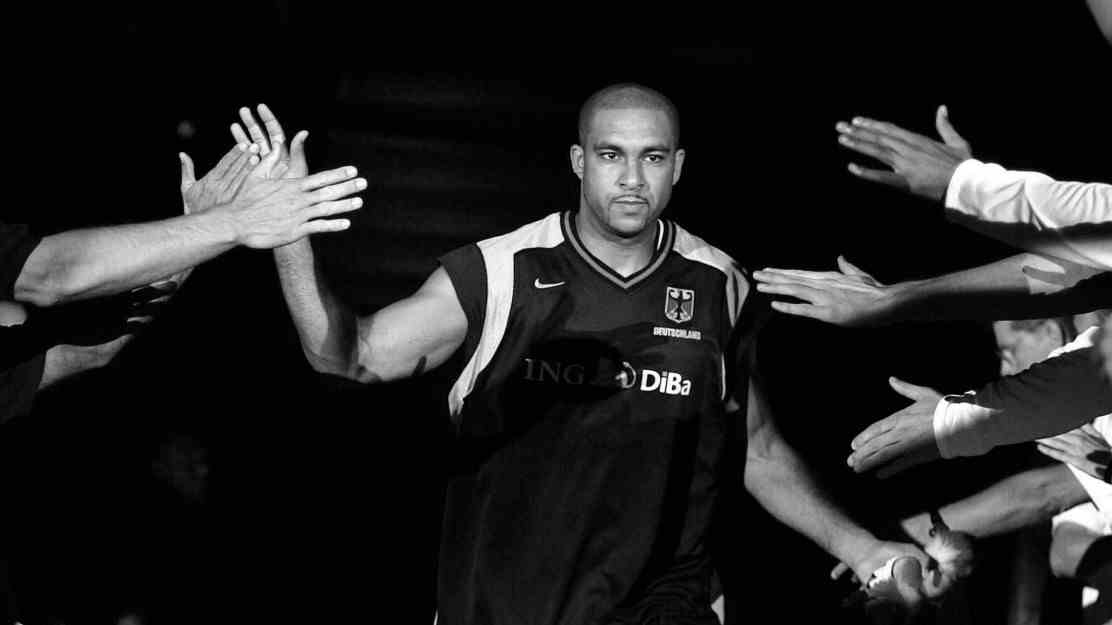Long sporting careers are often like adventure travel, as is Ademola Okulaja’s. His career took him to great heights and deep crises before he resigned in 2008 after many positions in Europe and the USA and as one of the most important German basketball players. Now, surprisingly for the public, he died at the age of 46.
Okulaja, later nicknamed “Warrior”, was one of those professional athletes who already had to assert themselves in a special environment in their youth. He got his first experience playing streetball after he came to Germany from Lagos/Nigeria at the age of three. At the peak of his career he was captain of the German national team, together with Dirk Nowitzki he was one of the most important players at the 2001 European Championships (fourth place) and on the highest point in German basketball to date, winning the bronze medal at the 2002 World Cup in the USA. He had previously won the Korac Cup as a key part of the Alba Berlin team.
A role model on the basketball court and for life
His sudden death – the cause is still unknown – provoked numerous dismayed reactions. “It’s so hard to understand and so incredibly sad,” wrote Marko Pesic, FC Bayern manager and one-time teammate of Okulaja. “The Alba family lost a friend and long-term companion today,” explained Marco Baldi, managing director of the Berlin first division club. FC Barcelona is also mourning – “a German basketball legend”. Okulaja portrayed all the good things about basketball “as a true competitor on the field and an even better gentleman off it,” said Euroleague boss Jordi Bertomeu.
After his cancer Ademola Okulaja threw himself into other tasks.
(Photo: Imago/Imago)
Nevertheless, Okulaja remained a personality with contrasting facets. In the game he developed ambition and a willingness to fight. In front of media representatives, he once got into a fight with his national coach Svetislav Pesic because he mocked Okulaja’s NBA ambitions. He can do it very well, Okulaja told Pesic, but: “You can’t.” Even though Pesic was more or less right at the time and his student didn’t do much better than his North Carolina college success, Okulaja remained an exceptional player. He became more and more a role model not only on the basketball court, but in general for the essentials in life.
The cancer was considered incurable, but you could press a “pause button”.
Because after he was able to enjoy success, he was also hit by the low blows of fate. Not only in sports, when he almost got an NBA engagement three times and was kicked out of the first squad at the last moment. But also in the phase when his life was suddenly threatened in 2008. Okulaja had cancer, an aggressive form that was discovered while preparing for the Beijing Olympics. First there were, he later told the magazine Five, only the back pain he was familiar with, but then it turned out that the cause was a tumor in the spine, one that experience has shown to shorten lifespan. This is not completely curable, reported Okulaja, but one could “press the pause button”.
He didn’t return to top-level sport, but life went on. Okulaja threw himself on other tasks, just as intensively as in his sports career. Together with a friend, he founded an agency that represented rappers – the musical equivalent, if you will, of the street basketball player he once was. He continued his education until the end, including in sports marketing. When he became a player’s agent, he helped, among other things, the German top player Dennis Schröder to get a job in the NBA.
It was the dream he could never achieve himself. Warrior – this nickname still remained appropriate.

